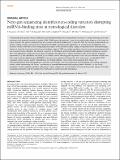Next-gen sequencing identifies non-coding variation disrupting miRNA-binding sites in neurological disorders
Abstract
Understanding the genetic factors underlying neurodevelopmental and neuropsychiatric disorders is a major challenge given their prevalence and potential severity for quality of life. While large-scale genomic screens have made major advances in this area, for many disorders the genetic underpinnings are complex and poorly understood. To date the field has focused predominantly on protein coding variation, but given the importance of tightly controlled gene expression for normal brain development and disorder, variation that affects non-coding regulatory regions of the genome is likely to play an important role in these phenotypes. Herein we show the importance of 3 prime untranslated region (3'UTR) non-coding regulatory variants across neurodevelopmental and neuropsychiatric disorders. We devised a pipeline for identifying and functionally validating putatively pathogenic variants from next generation sequencing (NGS) data. We applied this pipeline to a cohort of children with severe specific language impairment (SLI) and identified a functional, SLI-associated variant affecting gene regulation in cells and post-mortem human brain. This variant and the affected gene (ARHGEF39) represent new putative risk factors for SLI. Furthermore, we identified 3'UTR regulatory variants across autism, schizophrenia and bipolar disorder NGS cohorts demonstrating their impact on neurodevelopmental and neuropsychiatric disorders. Our findings show the importance of investigating non-coding regulatory variants when determining risk factors contributing to neurodevelopmental and neuropsychiatric disorders. In the future, integration of such regulatory variation with protein coding changes will be essential for uncovering the genetic causes of complex neurological disorders and the fundamental mechanisms underlying health and disease.
Citation
Devanna , P , Chen , X S , Ho , J , Gajewski , D , Smith , S D , Gialluisi , A , Francks , C , Fisher , S E , Newbury , D F & Vernes , S C 2018 , ' Next-gen sequencing identifies non-coding variation disrupting miRNA-binding sites in neurological disorders ' , Molecular Psychiatry , vol. 23 , no. 5 , pp. 1375-1384 . https://doi.org/10.1038/mp.2017.30
Publication
Molecular Psychiatry
Status
Peer reviewed
ISSN
1359-4184Type
Journal article
Description
Funding: This work was funded by a Marie Curie Career Integration Grant and by a Max Planck Research Group Grant both awarded to SCV. The work of the Newbury lab is funded by the Medical Research Council (G1000569/1 and MR/J003719/1). XSC, AG, CF and SEF were supported by the Max Planck Society. The UK Medical Research Council and the Wellcome Trust (Grant ref: 102215/2/13/2) and the University of Bristol provided core support for ALSPAC. The work of the Wellcome Trust Centre in Oxford is supported by the Wellcome Trust (090532/Z/09/Z). JH was supported by a scholarship from the Agency for Science, Technology, and Research, Singapore. The work of SDS is supported by the grant HD027802 from NIH.Collections
Items in the St Andrews Research Repository are protected by copyright, with all rights reserved, unless otherwise indicated.
Related items
Showing items related by title, author, creator and subject.
-
Discovery of the first genome-wide significant risk loci for attention deficit/hyperactivity disorder
ADHD Working Group of the Psychiatric Genomics Consortium (PGC); Early Lifecourse & Genetic Epidemiology (EAGLE) Consortium; 23andMe Research Team; Kent, Lindsey (2019-01) - Journal articleAttention deficit/hyperactivity disorder (ADHD) is a highly heritable childhood behavioral disorder affecting 5% of children and 2.5% of adults. Common genetic variants contribute substantially to ADHD susceptibility, but ... -
Genetic overlap between attention-deficit/hyperactivity disorder and bipolar disorder : evidence from genome-wide association study meta-analysis
PGC ADHD Working Group; PGC Bipolar Disorder Working Group; van Hulzen, Kimm J.E.; Scholz, Claus J.; Franke, Barbara; Ripke, Stephan; Klein, Marieke; McQuillin, Andrew; Sonuga-Barke, Edmund J.; Kelsoe, John R.; Landén, Mikael; Andreassen, Ole A.; Lesch, Klaus-Peter; Weber, Heike; Faraone, Stephen V.; Arias-Vasquez, Alejandro; Reif, Andreas; Kent, Lindsey (2017-11-01) - Journal articleBackground Attention-deficit/hyperactivity disorder (ADHD) and bipolar disorder (BPD) are frequently co-occurring and highly heritable mental health conditions. We hypothesized that BPD cases with an early age of onset ... -
Joint analysis of psychiatric disorders increases accuracy of risk prediction for schizophrenia, bipolar disorder, and major depressive disorder
Maier, Robert; Moser, Gerhard; Chen, Guo-Bo; Ripke, Stephan; Cross-Disorder Working Group of the Psychiatric Genomics Consortium (incl Kent L); Coryell, William; Potash, James B; Scheftner, William A; Shi, Jianxin; Weissman, Myrna M; Hultman, Christina M; Landén, Mikael; Levinson, Douglas F; Kendler, Kenneth S; Smoller, Jordan W; Wray, Naomi R; Lee, S Hong (2015-02-05) - Journal articleGenetic risk prediction has several potential applications in medical research and clinical practice and could be used, for example, to stratify a heterogeneous population of patients by their predicted genetic risk. ...

